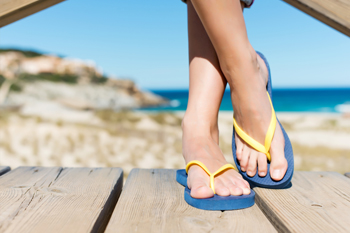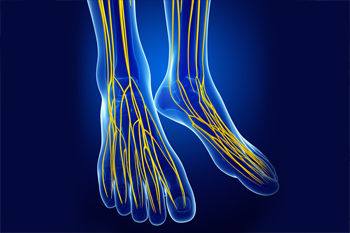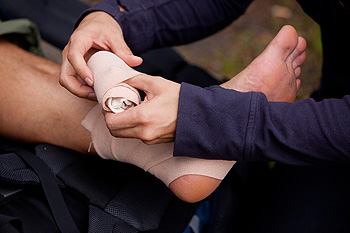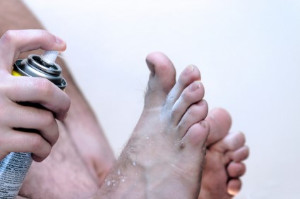Connect With Us
Items filtered by date: March 2021
Why Are Flip-Flops Bad for Your Feet?
 As the spring and summer months begin and bring warm weather with them, you may feel tempted to wear a pair of flip-flops. While these shoes are easy to slip on, they also make it easier to slip, leading to potential foot and ankle injuries. Furthermore, wearing flip-flops often can make you alter your gait or walking pattern. When you wear flip-flops, you tend to point your ankles inwards and curl your toes to keep the shoes on your feet. This unnatural walking pattern can lead to all sorts of foot problems, from hammertoes to heel spurs. Flip-flops also offer no arch support, which can lead to arch pain and plantar fasciitis. When the weather is warm, opt instead for sandals with heel straps, which will keep your foot in place. For more information about avoiding foot and ankle problems caused by footwear, please consult with a podiatrist.
As the spring and summer months begin and bring warm weather with them, you may feel tempted to wear a pair of flip-flops. While these shoes are easy to slip on, they also make it easier to slip, leading to potential foot and ankle injuries. Furthermore, wearing flip-flops often can make you alter your gait or walking pattern. When you wear flip-flops, you tend to point your ankles inwards and curl your toes to keep the shoes on your feet. This unnatural walking pattern can lead to all sorts of foot problems, from hammertoes to heel spurs. Flip-flops also offer no arch support, which can lead to arch pain and plantar fasciitis. When the weather is warm, opt instead for sandals with heel straps, which will keep your foot in place. For more information about avoiding foot and ankle problems caused by footwear, please consult with a podiatrist.
Flip-flops are not always the best choice of footwear. If you have any concerns about your feet or ankles, contact one of our podiatrists from The Podiatry Center, PC. Our doctors will assist you with all of your foot and ankle needs.
Flip-Flops and Feet
When the weather starts warming up, people enjoy wearing flip-flops. Flip-flops are comfortable, stylish, and easy to slip on and off; they're perfect for any summer beach goer. However, these shoes can cause harm to the feet.
How Can Flip-Flops Affect Me Long-Term?
- Ankle problems
- Hip problems
- Lower back problems
- Pain in the balls of the feet
- Problems with foot arches
- Changes in the way you walk
Are There Injuries Associated with Flip-Flops?
Yes. Since flip-flops are relatively weak and do not provide the same amount of support as sneakers, people who wear flip-flops regularly are more susceptible to injuries. On top of that, the open nature of the shoe makes your feet more prone to other problems, such as cuts and even infections. Common injuries and ailments include:
- Sprained ankles
- Blisters
- Infections
- Cuts and Scrapes
I like Wearing Flip-Flops. Are There Safe Alternatives?
When buying flip-flops, try to find ones that have sturdy soles and that are made of high-quality materials that will support for your feet. These flip-flops will cost more but will also last longer as a result.
If you have any questions please feel free to contact our office located in Millburn, NJ . We offer the newest diagnostic and treatment technologies for all your foot and ankle needs.
Arthritis Can Cause Pain in the Feet and Ankles
What Is Idiopathic Peripheral Neuropathy
 Idiopathic peripheral neuropathy refers to damage of the peripheral nerves where cause can not be determined. When the peripheral nerves are damaged, there are often symptoms that affect the feet. These can include numbness, a tingling or burning sensation, pain, a loss of sensation, muscle weakness, muscle spasms, or difficulty moving the lower limbs. Treatment for idiopathic peripheral neuropathy that affects the lower limbs focuses on managing the symptoms of the disease. Certain medications or physical therapy may be suggested. Mobility aids, such as orthotic shoes, canes, or braces may be prescribed to help you balance and walk. For more information about peripheral neuropathy, please consult with a podiatrist.
Idiopathic peripheral neuropathy refers to damage of the peripheral nerves where cause can not be determined. When the peripheral nerves are damaged, there are often symptoms that affect the feet. These can include numbness, a tingling or burning sensation, pain, a loss of sensation, muscle weakness, muscle spasms, or difficulty moving the lower limbs. Treatment for idiopathic peripheral neuropathy that affects the lower limbs focuses on managing the symptoms of the disease. Certain medications or physical therapy may be suggested. Mobility aids, such as orthotic shoes, canes, or braces may be prescribed to help you balance and walk. For more information about peripheral neuropathy, please consult with a podiatrist.
When dealing with systemic disease of the feet, it is extremely important to check the affected areas routinely so that any additional problems are caught quickly. If you have any concerns about your feet and ankles contact one of our podiatrists from The Podiatry Center, PC. Our doctors will assist you with all of your podiatric needs.
Systemic Diseases of the Feet
Systemic diseases affect the whole body, and symptoms usually are displayed in the feet. This condition can make a patient’s ability to walk unbearable. Systemic diseases include gout, diabetes mellitus, neurological disorders, and arthritis.
Gout – is caused by an excess of uric acid in the body. Common symptoms include pain, inflammation, and redness at the metatarsal/phalangeal joint of the base big toe. Gout can be treated by NSAIDs to relieve pain and inflammation, and other drugs that lower the acid levels in the body.
Diabetes mellitus – is an increase in the level of blood sugar that the body cannot counteract with its own insulin. Failure to produce enough insulin is a factor in Diabetes.
Diabetes of the Feet
Diabetic Neuropathy – may lead to damaged nerves and affect the feet through numbness and loss of sensation.
Peripheral Vascular Disease – can restrict the blood flow to the feet, and often times lead to amputation of the feet.
If you have any questions please feel free to contact our office located in Millburn, NJ . We offer the newest diagnostic and treatment technologies for all your foot and ankle needs.
Is My Ankle Sprained or Strained?
 Ankle sprains affect the ligaments of the ankle. When any of these ligaments are overstretched, twisted, or torn, an ankle sprain may occur. Ankle sprains and strains can sometimes be difficult to tell apart, as they have many overlapping symptoms. An ankle sprain usually happens suddenly around the ankle joint. Symptoms include pain, swelling, bruising, a limited range of motion, and difficulty bearing weight. You may also hear a pop or feel a popping sensation at the time of injury. A strain can occur suddenly or over a longer period of time. Symptoms include pain, tenderness, swelling, bruising, muscle spasms or cramping, muscle weakness, and a restricted range of motion. If you have any of these symptoms, please see a podiatrist, who can diagnose and treat your ankle strain or sprain.
Ankle sprains affect the ligaments of the ankle. When any of these ligaments are overstretched, twisted, or torn, an ankle sprain may occur. Ankle sprains and strains can sometimes be difficult to tell apart, as they have many overlapping symptoms. An ankle sprain usually happens suddenly around the ankle joint. Symptoms include pain, swelling, bruising, a limited range of motion, and difficulty bearing weight. You may also hear a pop or feel a popping sensation at the time of injury. A strain can occur suddenly or over a longer period of time. Symptoms include pain, tenderness, swelling, bruising, muscle spasms or cramping, muscle weakness, and a restricted range of motion. If you have any of these symptoms, please see a podiatrist, who can diagnose and treat your ankle strain or sprain.
Although ankle sprains are common, they aren’t always minor injuries. If you need your ankle injury looked at, contact one of our podiatrists from The Podiatry Center, PC. Our doctors can provide the care you need to keep you pain-free and on your feet.
How Does an Ankle Sprain Occur?
Ankle sprains are the result of a tear in the ligaments within the ankle. These injuries may happen when you make a rapid shifting movement while your foot is planted. A less common way to sprain your ankle is when your ankle rolls inward while your foot turns outward.
What Are the Symptoms?
- Pain at the sight of the tear
- Bruising/Swelling
- Ankle area is tender to touch
- In severe cases, may hear/feel something tear
- Skin discoloration
Preventing a Sprain
- Wearing appropriate shoes for the occasion
- Stretching before exercises and sports
- Knowing your limits
Treatment of a Sprain
In many cases, the RICE method (Rest, Ice, Compression, and Elevate) is used to treat ankle sprains. However, you should see a podiatrist to see which treatment option would work best with your injury. In severe cases, surgery may be required.
It is important to ask your doctor about rehab options after you receive treatment for your injury. Stretching, strength training, and balance exercises may help the ankle heal while also preventing further injury.
If you have any questions, please feel free to contact our office located in Millburn, NJ . We offer the newest diagnostic and treatment technologies for all your foot care needs.
Gout Pain Can Be Managed
Signs and Causes of Athlete’s Foot
 Athlete’s foot is a fungal infection that affects the skin of the feet, mainly in between the toes. The infection usually causes a rash that becomes red, itchy, scaly, and dry. Other signs of athlete’s foot can include a foul odor, cracked skin, peeling of the skin, and a burning sensation. While anyone can get athlete’s foot, the fungus that causes athlete’s foot is usually spread in warm and moist environments such as communal showers or public pools. Athlete’s foot can also spread from sharing items that touch the feet. Patients who believe they have developed this condition should visit a podiatrist for a professional diagnosis and treatment plan.
Athlete’s foot is a fungal infection that affects the skin of the feet, mainly in between the toes. The infection usually causes a rash that becomes red, itchy, scaly, and dry. Other signs of athlete’s foot can include a foul odor, cracked skin, peeling of the skin, and a burning sensation. While anyone can get athlete’s foot, the fungus that causes athlete’s foot is usually spread in warm and moist environments such as communal showers or public pools. Athlete’s foot can also spread from sharing items that touch the feet. Patients who believe they have developed this condition should visit a podiatrist for a professional diagnosis and treatment plan.
Athlete’s foot is an inconvenient condition that can be easily reduced with the proper treatment. If you have any concerns about your feet and ankles, contact one of our podiatrists from The Podiatry Center, PC. Our doctors will treat your foot and ankle needs.
Athlete’s Foot: The Sole Story
Athlete's foot, also known as tinea pedis, can be an extremely contagious foot infection. It is commonly contracted in public changing areas and bathrooms, dormitory style living quarters, around locker rooms and public swimming pools, or anywhere your feet often come into contact with other people.
Solutions to Combat Athlete’s Foot
- Hydrate your feet by using lotion
- Exfoliate
- Buff off nails
- Use of anti-fungal products
- Examine your feet and visit your doctor if any suspicious blisters or cuts develop
Athlete’s foot can cause many irritating symptoms such as dry and flaking skin, itching, and redness. Some more severe symptoms can include bleeding and cracked skin, intense itching and burning, and even pain when walking. In the worst cases, Athlete’s foot can cause blistering as well. Speak to your podiatrist for a better understanding of the different causes of Athlete’s foot, as well as help in determining which treatment options are best for you.
If you have any questions please feel free to contact our office located in Millburn, NJ . We offer the newest diagnostic and treatment technologies for all your foot and ankle needs.
How to Reduce Feet Swelling During Pregnancy
During pregnancy, the body’s blood volume and bodily fluids can increase by as much as fifty percent. Your feet are one of the areas where this excess fluid is often concentrated, along with the ankles and calves. Swollen feet can be uncomfortable and even painful. Fortunately, you can take several measures at home to reduce swelling. Avoid standing for prolonged periods of time and elevate your feet frequently to prevent the fluid from pooling in your feet. Soaking your feet in cool water mixed with Epsom salt may help decrease swelling as well. Drinking water and reducing your caffeine intake can also be helpful in reducing water retention. If you are experiencing foot and ankle pain during your pregnancy that does not respond to home treatment, please consult with a podiatrist.
Pregnant women with swollen feet can be treated with a variety of different methods that are readily available. For more information about other cures for swollen feet during pregnancy, consult with one of our podiatrists from The Podiatry Center, PC. Our doctors will attend to all of your foot and ankle needs.
What Foot Problems Can Arise During Pregnancy?
One problem that can occur is overpronation, which occurs when the arch of the foot flattens and tends to roll inward. This can cause pain and discomfort in your heels while you’re walking or even just standing up, trying to support your baby.
Another problem is edema, or swelling in the extremities. This often affects the feet during pregnancy but tends to occur in the later stages.
How Can I Keep My Feet Healthy During Pregnancy?
- Wearing orthotics can provide extra support for the feet and help distribute weight evenly
- Minimize the amount of time spent walking barefoot
- Wear shoes with good arch support
- Wear shoes that allow for good circulation to the feet
- Elevate feet if you experience swelling
- Massage your feet
- Get regular, light exercise, such as walking, to promote blood circulation to the feet
If you have any questions please feel free to contact our office located in Millburn, NJ . We offer the newest diagnostic and treatment technologies for all your foot and ankle needs.
Blog Archives
- April 2025
- March 2025
- February 2025
- January 2025
- December 2024
- November 2024
- October 2024
- September 2024
- August 2024
- July 2024
- June 2024
- May 2024
- April 2024
- March 2024
- February 2024
- January 2024
- December 2023
- November 2023
- October 2023
- September 2023
- August 2023
- July 2023
- June 2023
- May 2023
- April 2023
- March 2023
- February 2023
- January 2023
- December 2022
- November 2022
- October 2022
- September 2022
- August 2022
- July 2022
- June 2022
- May 2022
- April 2022
- March 2022
- February 2022
- January 2022
- December 2021
- November 2021
- October 2021
- September 2021
- August 2021
- July 2021
- June 2021
- May 2021
- April 2021
- March 2021
- February 2021
- January 2021
- December 2020
- November 2020
- October 2020
- September 2020
- August 2020
- July 2020
- June 2020
- May 2020
- April 2020
- March 2020
- February 2020
- January 2020
- December 2019
- November 2019
- October 2019
- September 2019
- August 2019
- July 2019
- June 2019
- May 2019
- April 2019
- March 2019
- February 2019
- January 2019
- December 2018
- November 2018
- October 2018
- September 2018
- August 2018
- July 2018
- June 2018
- May 2018
- April 2018
- March 2018
- February 2018
- January 2018
- December 2017
- November 2017
- October 2017
- September 2017
- August 2017
- July 2017
- June 2017
- May 2017
- April 2017
- March 2017
- February 2017
- January 2017
- December 2016
- November 2016
- October 2016
- September 2016
- August 2016
- July 2016
- June 2016
- May 2016
- April 2016
- March 2016
- February 2016
- January 2016
- December 2015
- November 2015
- October 2015
- September 2015
- August 2015
- July 2015
- June 2015
- May 2015
- January 2014
- December 2013
- November 2013
- October 2013
- September 2013
- August 2013
- July 2013
- June 2013
- May 2013
- April 2013
- March 2013
- February 2013
- January 2013
- December 2012
- November 2012
- October 2012
- September 2012
- August 2012
- July 2012
- June 2012



